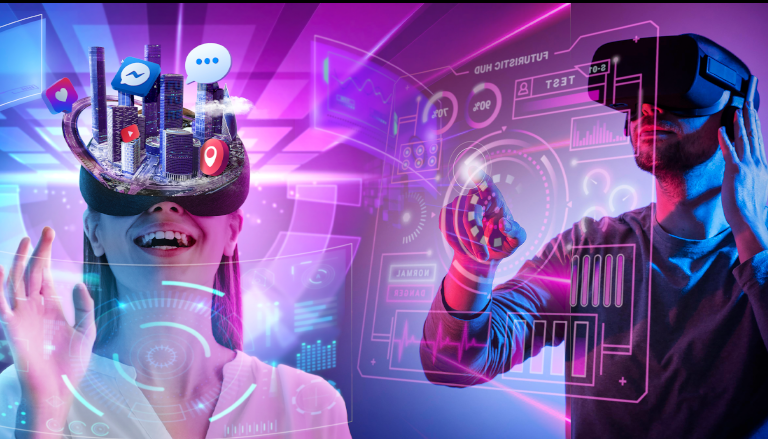The concept of the “metaverse” is quickly becoming one of the hottest topics in the tech world. It promises to transform the way we use digital space. Social media companies are building their brand identities around it, and startups are exploring new possibilities. The metaverse is much discussed, but what exactly does it mean? How will it change our future digital lives? To answer these questions, we need to understand the origins of the idea, its current development, and the challenges and opportunities.
How to Understand the Metaverse
The metaverse is a network of interconnected digital spaces where people can use virtual and augmented reality to socialize, work, play, and create. The metaverse aims to place people in a shared 3D digital world, unlike the internet we access today through computers. It’s like a parallel universe where games, social media, and real-life relationships converge into a seamless experience. The metaverse isn’t a single product from a single company. Rather, it’s a shared concept for the next phase of the digital age.
What can virtual reality and augmented reality do for you?
The most relevant tools for developing virtual worlds are virtual reality and augmented reality. VR headsets allow users to enter a fully digital world. Augmented reality, on the other hand, uses smartphones or AR glasses to add digital features to the real world. These technologies will continue to improve in the coming years, making the virtual world even more attractive and accessible. As devices become smaller, cheaper, and more powerful, access to the digital world will continue to decline.
How the virtual world is changing the way we work
Many people have already changed their jobs by being able to work from home, and the virtual world has the potential to make these changes even more profound. Imagine giving a presentation in a virtual meeting room, where everyone feels like they’re there, even if they’re in a different country. Immersive models can be used for training to learn skills, and companies can create virtual campuses to help people collaborate. The metaverse could transform what it means to be productive and collaborate in the digital age by making the workplace more engaging and dynamic.
How People Will Interact in the Future
Today, people around the world connect through social media, but the metaverse promises to make these connections more real and meaningful. People can go beyond simply checking newsfeeds and catching up with friends in a virtual bar, attending a gig at a virtual venue, or embarking on adventures with others in new worlds. Virtual characters, represented by avatars, offer people ways to express themselves and raise questions about identity and legitimacy. As we connect digitally and in real life, the way we form communities and relationships will change significantly.
Opportunities for Trade and Commerce
The metaverse is expected to create entirely new business and market opportunities. Some brands are already experimenting with virtual stores, digital apparel, and sponsored experiences on metaverse websites. Non-fungible tokens (NFTs) and other digital assets are becoming increasingly popular as ways to buy and sell unique virtual items. In the future, you might be able to shop in fully realistic 3D spaces, watch fashion shows in digital worlds, or buy homes in virtual communities. The metaverse offers companies new ways to connect with customers and create experiences that go beyond online shopping.
How People Learn and Teach in the Metaverse
Another area ripe for change is education. Students from around the world could potentially study together in virtual classrooms that look and feel like laboratories, museums, or historical sites. Practical digital models could be used to teach challenging subjects like engineering and science, making learning more engaging and practical. The metaverse could make education more open and accessible to everyone by removing barriers such as distance and cost.
Questions and Ethical Issues Worth Considering
The metaverse offers both interesting prospects and significant challenges. In virtual environments, privacy, data security, and digital rights will become even more important. Large corporations can monopolize certain areas, potentially hindering the spread of new ideas and perspectives. Moreover, there are societal concerns, such as the risk of addiction or the increasingly blurred lines between real
Real people, along with algorithms that ensure each user has a unique experience. Artificial intelligence (AI) ensures that digital platforms are engaging, dynamic, and responsive through methods like content monitoring and natural language processing. As the metaverse grows, the addition of AI will be crucial for its scalability and longevity.
Questions about the metaverse
Are virtual reality and the metaverse the same?
Not really. VR is one way to enter the metaverse. The metaverse is a broader concept that encompasses virtual reality, augmented reality, artificial intelligence, and other digital systems that work together to create interconnected virtual worlds.
Will the metaverse replace the web?
The metaverse will likely develop as a complement to the internet rather than as a standalone entity. It will make digital activities more attractive and engaging, but it will still leverage the internet’s infrastructure.
Can you make money in the metaverse?
Yes, the metaverse already makes it possible to monetize digital goods, games, artistic services, and virtual real estate. As the metaverse economy grows, these possibilities will only increase.
How do you access the metaverse? What do you need?
Currently, you can visit most websites using VR headsets, game consoles, regular computers, and smartphones. Over time, specialized devices like AR glasses will make access even easier.
When will most people use the metaverse?
Many experts believe that metaverse platforms will become commonplace in digital life within the next decade. While the exact date is unclear, the technology and infrastructure will likely improve over time.
In summary
The metaverse is one of the most significant technological shifts we have ever seen. By creating fully realistic digital worlds that merge with the real world, it has the potential to transform the way we work, connect, shop, and learn. While there are challenges, such as privacy, accessibility, and ethical regulations, there are also enormous opportunities for exchange and the development of new ideas. As businesses, schools, and individuals continue to explore this new technology, the metaverse will become an essential part of the digital life of the future.

